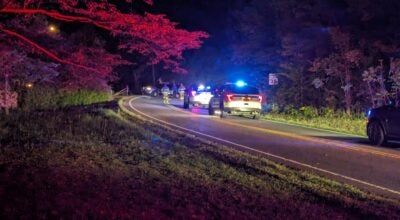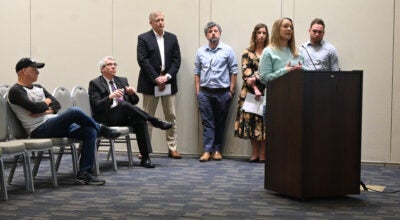Warren, GOP lawmakers discuss education
Published 12:00 am Friday, August 10, 2012
By Karissa Minn
kminn@salisburypost.com
SALISBURY — School teachers, administrators and board members got the chance Friday to ask state lawmakers directly about bills affecting education.
For his latest monthly town hall meeting, N.C. Rep. Harry Warren (Rowan) invited several of his fellow Republican legislators to speak with the public about their education concerns and questions.
First, some of the House members gave their thoughts on the General Assembly’s recent actions.
N.C. Rep. Bryan Holloway (Rockingham, Stokes), chairman of the House Appropriations Subcommittee on Education, said lawmakers did more for the state’s schools this session than most people realize.
“We invested $135 million more in kindergarten through 12th grade,” Holloway said. “We also gave our teachers and state employees the first raise they’ve had in four years.”
At the beginning of 2011, the legislature faced a record budget shortfall, Holloway said. They were able to close it and avoid the same problems this year, he said, while making up $70 million of a $190 million cut to education from the federal government.
Warren said the budget amount doesn’t include all of the state funding that will be going to schools. For example, money from the sale of cars confiscated under the new “Run and You’re Done” law goes toward education.
Much of the question and answer session focused on charter schools, which receive both public and private funding. Last year, the N.C. General Assembly lifted the cap on the number of charter schools in the state as well as their enrollment.
Jim Emerson, chairman of the Rowan-Salisbury Board of Education, asked what rules and regulations apply to charter schools.
N.C. Rep. Paul “Skip” Stam (Wake), House majority leader, replied that the state board of education charters each of the schools and applies its own regulations. Local school boards also can submit charters.
“The statutes provide for a lot of rules, but they’re exempted from some of the rules for traditional public schools,” he said. “You would do wonders for your county if you could just have your existing schools be charter schools.”
School board member Jean Kennedy said it seems like legislators are trying to dismantle traditional public schools.
Stam said he thinks there are advantages to freeing schools from certain requirements and restrictions.
Warren added that charter schools are only one way of delivering education, and traditional public or private schools might be better for some students.
Holloway, who was a teacher himself, said more students in charter schools can actually mean more money for public schools and smaller class sizes.
“There’s no one here today looking to dismantle our public schools,” Holloway said.
Todd Adams, a member of the Kannapolis Board of Education, said there are concerns about the fact that charter schools aren’t held to the same standards as traditional public schools.
“They can accept students and dismiss students differently than we can, and they don’t have to offer the same services as public schools do,” Adams said.
School board candidate Lynn Marsh asked if teachers in charter schools have the same requirements as teachers in public schools.
Stam answered that they don’t. Not all teachers at charter schools must be certified — only a certain percentage. They also don’t have to be paid at the same rate.
Bryce Beard, another Rowan-Salisbury school board member, said teachers are facing increased pressure to help raise children who come from single-parent or unsupportive homes.
Beard said that the first “assault” on public schools came from private schools, to which Warren replied that private schooling is a choice parents have the right to make.
• • •
Several other issues came up at the meeting as well.
A school principal asked about “monumental” new assessments that high schools are required to give during the first semester.
Holloway said those tests come from an agreement between the federal government and N.C. Gov. Beverly Perdue for Race to the Top grant funding.
“In my mind, I wish we could take the money and give it back to the federal government,” Holloway said. “All it came with was a bunch of red tape, strings and regulations.”
Dr. Judy Grissom, superintendent of Rowan-Salisbury Schools, asked when local school systems might be given control over their calendars.
“It’s so difficult to get everything in that short period of time … with inclement weather and everything,” Grissom said. “I think it would be great if districts could choose a start and end date like we used to.”
Holloway answered that the issue of school calendars isn’t a partisan issue but a geographical one, because systems in eastern North Carolina say it affects tourism. He said he wants to see local control returned, but it’s hard to get the votes to pass such a bill.
“Please keep pushing it, because we desperately need it,” Grissom said.
Carol Spalding, president of Rowan-Cabarrus Community College, asked what the legislators’ plans were for tuition increases for community colleges.
“We’ve already experienced a 58 percent increase in four years,” Spalding said.
Stam answered that there are no plans for increases, and legislators want to keep tuition as low as possible.
Also in attendance were N.C. Sen. Andrew Brock (Davie, Rowan) and N.C. Reps. Fred Steen (Rowan), Bill Brawley (Mecklenburg), Sarah Stevens (Alleghany, Surry) John Torbett (Gaston), Craig Horn (Union) and Larry Brown (Davidson, Forsyth).
Contact reporter Karissa Minn at 704-797-4222.
Twitter: twitter.com/postcopolitics
Facebook: facebook.com/Karissa.SalisburyPost





